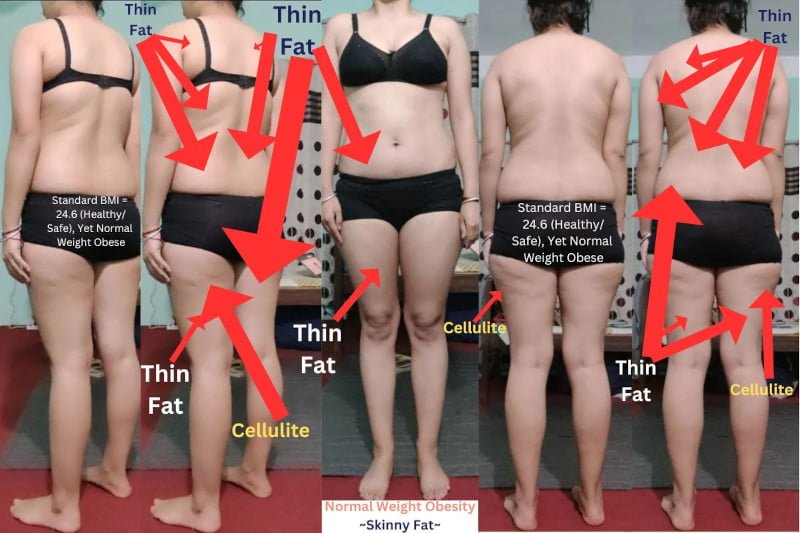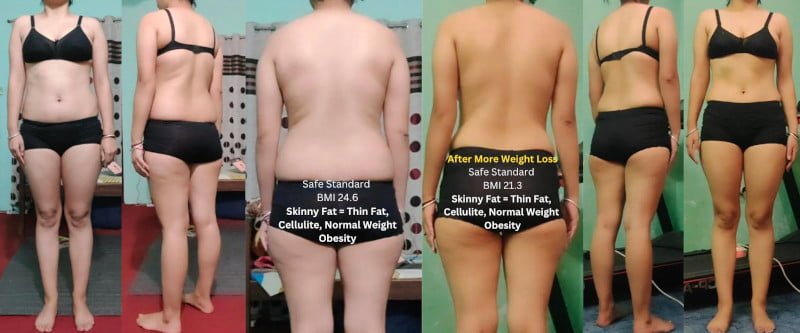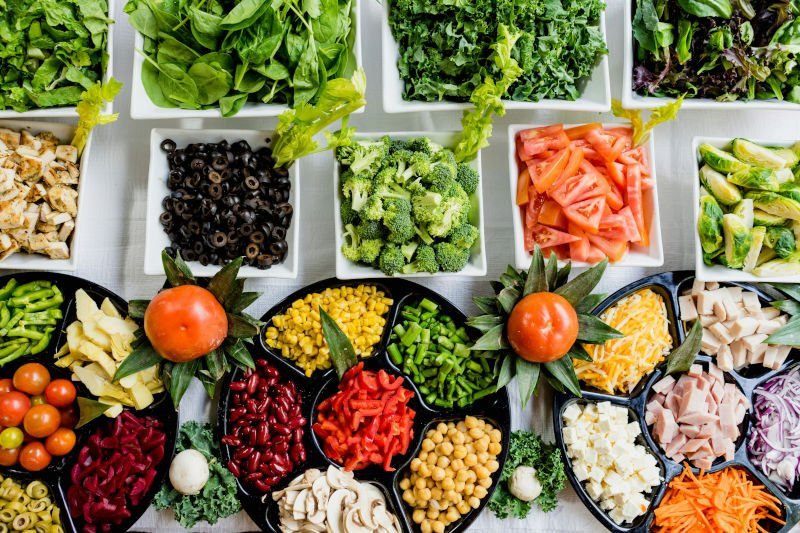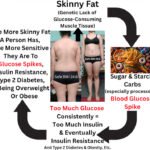The Best Skinny Fat Lifestyle, According to Science
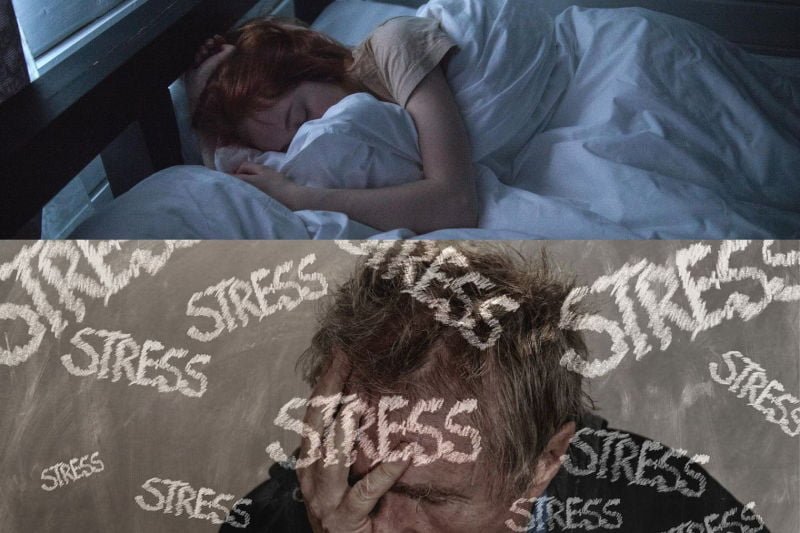
The best skinny fat diet is low-carb, and the best skinny fat exercises are walking and weightlifting. So, what is the best skinny fat lifestyle in terms of sleep, stress, environment, and the like?
Choosing a healthy lifestyle plays a key role in helping to safely, sustainably, and successfully lose, maintain, and manage regular white/yellow fat weight and muscle/mass weight, no less, to help reduce skinny fat as much as possible in the short and long term. The latest scientific research strongly indicates that regular fat weight loss and gain — being overweight or obese — are directly influenced by sleep (1) and stress (2). The science also shows that negative sleep and stress adversely affect muscle/mass (3, 4). Minimal stress and consistent, regular, deep, high-quality (refreshing) sleep equate to a healthier (5, 6) metabolism, body composition, bodily functioning, well-being, aging, and longevity, in general.
The Best Skinny Fat Lifestyle – Sleep
How much deep sleep do you need to be considered healthy? Science recognizes that the typical healthy sleep standard is defined as 7 to 9 hours (7, 8) of high-quality deep sleep that leaves you refreshed and ready to go the next day. Although genetics and age matter, no less. The younger (9) you are, the more sleep you need.
The current CDC (10) Sleep Standard guidelines are:
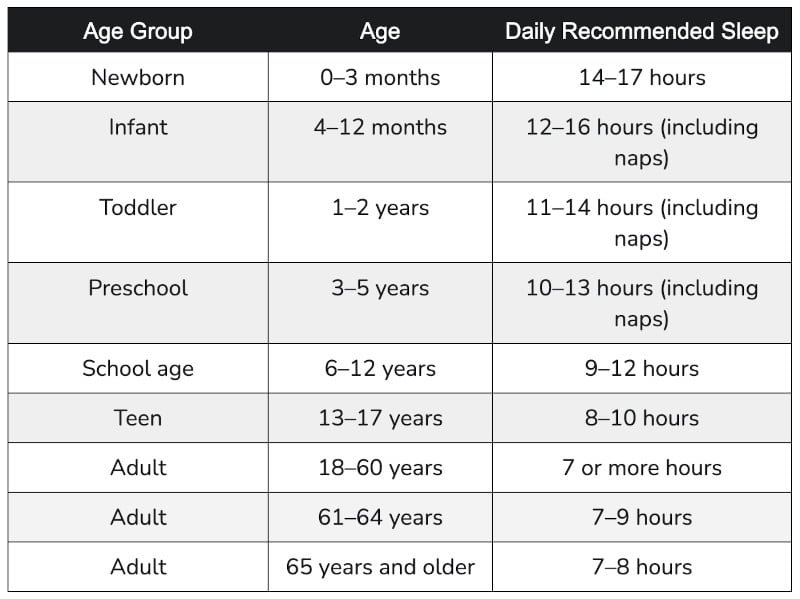 Some people, sometimes called “short sleepers“(11, 12, 13, 41), genetically function on less sleep without any known negative consequences to their health. Just as some people genetically are “long sleepers“(38, 39) and can safely function off more than 9 hours of sleep and be healthy.
Some people, sometimes called “short sleepers“(11, 12, 13, 41), genetically function on less sleep without any known negative consequences to their health. Just as some people genetically are “long sleepers“(38, 39) and can safely function off more than 9 hours of sleep and be healthy.
Phases and Stages of Sleep
There are two phases/cycles (14) of sleep that are required for deep, high-quality sleep. Phase one, which includes three stages (N1, N2, N3), is nonrapid eye movement (NREM) sleep. Phase two is rapid eye movement (REM) sleep, AKA stage four. Deep, high-quality, repairing, rejuvenating, refreshing, and healing sleep occurs when the body cycles through all four stages (15) approximately 4 to 6 times per night, with each cycle averaging between 70 to 120 minutes.
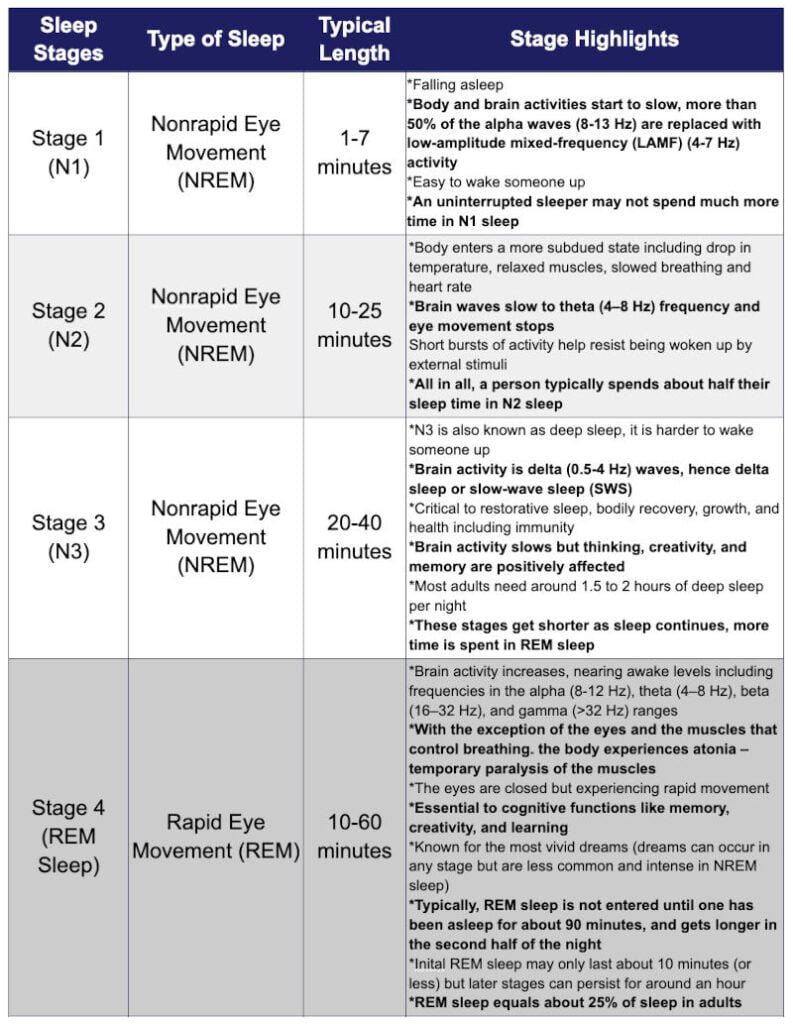
Sleep deprivation can lead to decreased/slow metabolism (16, 17, 18, 19) during waking hours including glucose imbalance (20), insulin (hormone) resistance (20), an imbalance of other hormones (20) involved in regulating metabolism (decreased levels of leptin – satiety – and increased levels of ghrelin – hunger), and a prediabetic state (21), no less, in an otherwise healthy person. Too much sleep can also have similar negative effects (22). All of this no less than affects appetite and metabolism, increasing (23) the risk of being overweight, type-2 diabetes, and being obese — which means having too much regular white/yellow fat on your body, exacerbating skinny fat.
How to Get More Deep Sleep – Best Deep Sleep Techniques
Seek professional help as needed. Here are some scientific Deep Sleep Guidelines (24, 25, 26) to follow:
1 – Keep a regular and consistent sleep schedule – go to bed and rise at the same time every day, including weekends, as this reinforces your body’s sleep-wake cycle; whether you are naturally an early bird or a night owl is determined by your genetics (27, 28).
2 – Choose food, drink, and substances carefully before sleep – don’t eat too little or too much while avoiding too much sugar, caffeine too late in the day, alcohol in excess and too close to bed, nicotine and drugs in general, and heavy foods including fast, junk, and processed foods.

3 – Create a sleep-friendly, restful environment – quiet, dark, cool, clean, and safe are key while minimizing technology (screens, video, audio, etc.) exposure, allowing for wind down relaxation time, and choosing quality, natural bedding (mattress, sheets, pillows).
4 – Avoid long daytime naps – 20 minutes to a half hour are typically best, earlier in the day, and no more than an hour.
5 – Proper physical activity/exercise – regular and consistent activity including cardio and resistance exercise.
6 – Keep stress to a minimum – anxiety and worry can interrupt sleep; proper stress management is the solution.
Stress – The Best Skinny Fat Lifestyle
Life gets busy and even overwhelming at times, especially into adulthood, which affects stress levels. The more stress you are experiencing, the more it can negatively affect no less than your diet, exercise, lifestyle, metabolism, body composition, and hormones. Chronic stress (29) is directly linked to regular fat weight gain and being overweight or obese, as well as increased difficulty in terms of losing regular fat (especially when in excess). As you know, regular fat directly influences skinny fat.
The latest science (30) reveals that stress (physical or psychological) intimately influences metabolic rate and hormones — which affect regular fat weight loss and gain as well as muscle maintenance, repair, and growth, at least. Cortisol, an essential hormone involved in “fight-or-flight” (31) that affects nearly all organs and tissues in your body, regulates your body’s stress response and controls your fat, protein, and carbohydrate use — your metabolism.
Increased stress influences cortisol, weakening/slowing down metabolism (32, 33, 34, 35). Which means you burn fewer calories. As the stress subsides, your metabolism (calories burned) returns to normal. That is, unless you are experiencing prolonged (chronic) stress, and your body does not get the opportunity to recover.
How to Reduce and Manage Stress – Best Stress Reduction Techniques
Seek professional help as needed. Here are some science-based Stress Reduction Guidelines (36, 37, 38) to follow:
1 – Live within your means – avoid debt, living on the edge, poor financial management, and procrastination (in any form).

2 – Find a healthy hobby you genuinely enjoy – “me time”, something that will help you safely and sustainably refocus your attention and take your mind off the stressor(s) in your life for a reasonable amount of time (moderation) — ideas include art (painting, music, photography, videography, comedy, etc.), dance, sewing/knitting/crochet, gardening, reading, meditation, mindfulness, deep breathing, board games, video games, time with pets, friends, and/or family, join a group, volunteer, journaling, or such (that is a short list).
3 – Create and maintain boundaries (learn to say no) – don’t let anyone walk all over you.
4 – Choose a regular, consistent healthy diet – the best scientific diet is a properly executed low-carb diet.
5 – Regular, consistent exercise – cardio or resistance.
6 – Spend time in nature (this can go hand-in-hand with hobbies and exercise) – visit and immerse yourself in a safe, peaceful natural setting.
7 – Self-care (allow yourself a little indulgence on occasion) – get a message, spa treatment, or the like, treat yourself to a nice meal, buy yourself something special (within reason), positive self-talk, etc.
8 – Minimize technology – phone and screen time, especially.
9 – Avoid unhealthy environments – this includes toxic places, people, and situations.
10 – Avoid substance abuse – alcohol, nicotine, caffeine, cannabis, sugar (fast, junk, and processed foods), drugs, etc.
Lifestyle & Environment

How you live is just as important as where you live.
The more toxic your environment, in terms of polluted air, land, and water relative to chemicals, burning, unrest, war, and the like, the higher the probability that your health is negatively affected, and likely very seriously. Sleep is disrupted and stress increases, which further irritates and weakens the body and health. Throw in aging, and as the years pass the body is less capable of dealing with things, in general, including maintaining a healthy weight, and more susceptible to disease and decline — physically, mentally, and emotionally, no less.
People can be equally toxic and damaging to health, including family and friends. Especially social media.
The healthier your environment, the healthier you are relative to no less than diet, exercise, lifestyle, and unique genetic body composition.

How Skinny Fat Affects Mental Health
References
- Sleep Foundation: Sleep and Weight Loss, April 11, 2024, Rob Newsom and Kimberly Truong, M.D. https://www.sleepfoundation.org/physical-health/weight-loss-and-sleep
- Healthline: Stress and Weight Loss: What’s the Connection?, August 1, 2018, Natalie Silver (Medically reviewed by Timothy J. Legg, PhD, PsyD). https://www.healthline.com/health/stress/stress-weight-loss
- NIH, National Library of Medicine: Effect of changes in sleeping behavior on skeletal muscle and fat mass: a retrospective cohort study, September 28, 2023, Jihun Song, Sun Jae Park, Seulggie Choi, Minjung Han, Yoosun Cho, Yun Hwan Oh, Sang Min Park. https://pubmed.ncbi.nlm.nih.gov/37770876/
- Men’s Health: How stress sabotages muscle building and weightloss goals, August 29, 2018, Annie Hayes. https://www.menshealth.com/uk/health/a759406/how-stress-sabotages-muscle-building-and-weight-loss-goals/
- NIH, National Library of Medicine: Sleep and Biological Aging: A Short Review, April 5, 2021, Judith E. Carroll, PhD, and Aric A. Prather, PhD. https://www.ncbi.nlm.nih.gov/pmc/articles/PMC8658028/
- NIH, National Library of Medicine: Stress-Induced Biological Aging: A Review and Guide for Research Priorities, May 31, 2022, Lilian R. Polsky, Kelly E. Rentscher, Ph.D., and Judith E. Carroll. https://www.ncbi.nlm.nih.gov/pmc/articles/PMC10243290/
- Healthline: How Many Hours of Sleep Do You Really Need?, August 6, 2024, Taylor Jones, RD (Medically reviewed by Nick Villalobos, MD). https://www.healthline.com/nutrition/how-much-sleep-you-need
- Harvard Health Publishing: How much sleep do you actually need?, October 30, 2023, Matthew Solan, Executive Editor. https://www.health.harvard.edu/blog/how-much-sleep-do-you-actually-need-202310302986
- NIH, National Heart, Lung, and Blood Institute: How Much Sleep Is Enough?, https://www.nhlbi.nih.gov/health/sleep/how-much-sleep
- CDC: About Sleep, May 15, 2024. https://www.cdc.gov/sleep/about/?CDC_AAref_Val=https://www.cdc.gov/sleep/about_sleep/how_much_sleep.html
- NIH, National Institutes of Health: Gene identified in people who need little sleep, September 17, 2019. https://www.nih.gov/news-events/nih-research-matters/gene-identified-people-who-need-little-sleep
- Popular Mechanics: Some People Have a Superhuman Strength: Only Needing 4 Hours of Sleep, June 27, 2022, Manasee Wagh. https://www.popularmechanics.com/science/health/a40082205/short-sleepers/
- NIH, National Library of Medicine: Physiology, Sleep Stages, January 26, 2024, Aakash K. Patel; Vamsi Reddy; Karlie R. Shumway; John F. Araujo. https://www.ncbi.nlm.nih.gov/books/NBK526132/
- Sleep Foundation: Stages of Sleep: What Happens in a Sleep Cycle, December 8, 2023, Eric Suni and Dr. Abhinav Singh. https://www.sleepfoundation.org/stages-of-sleep
- Scientific American: Why Do Some People Need Less Sleep? It’s in Their DNA, October 16, 2019, Karen Weintraub. https://www.scientificamerican.com/article/why-do-some-people-need-less-sleep-its-in-their-dna/
- WebMD: Sleep More, Weigh Less, August 14, 2022, https://www.webmd.com/diet/sleep-and-weight-loss
- NIH, National Library of Medicine: The Metabolic Consequences of Sleep Deprivation, April 7, 2007, Kristen L. Knutson, PhD, Karine Spiegel, PhD, Plamen Penev, MD, PhD, and Eve Van Cauter, PhD. https://www.ncbi.nlm.nih.gov/pmc/articles/PMC1991337/
- Penn State: Sleep deprivation may lead to slower metabolism, weight gain, September 20, 2019, Kristie Auman-Bauer. https://www.psu.edu/news/research/story/sleep-deprivation-may-lead-slower-metabolism-weight-gain/
- ScienceDaily: Lack of sleep affects fat metabolism, September 16, 2019. https://www.sciencedaily.com/releases/2019/09/190916114020.htm
- NIH, National Library of Medicine: Sleep and Metabolism: An Overview, August 2, 2010, Sunil Sharma and Mani Kavuru. https://www.ncbi.nlm.nih.gov/pmc/articles/PMC2929498/
- Johns Hopkins Medicine, Health: The Science of Sleep: Understanding What Happens When You Sleep, https://www.hopkinsmedicine.org/health/wellness-and-prevention/the-science-of-sleep-understanding-what-happens-when-you-sleep
- WebMD: Physical Side Effects of Oversleeping, January 15, 2022, Hilary Parker (Medically reviewed by Carol DerSarkissian, MD). https://www.webmd.com/sleep-disorders/physical-side-effects-oversleeping
- NIH, National Library of Medicine: Sleep Deprivation: Effects on Weight Loss and Weight Loss Maintenance, April 14, 2022, Evangelia Papatriantafyllou, Dimitris Efthymiou, Evangelos Zoumbaneas, Codruta Alina Popescu, and Emilia Vassilopoulou. https://www.ncbi.nlm.nih.gov/pmc/articles/PMC9031614/
- Mayo Clinic: Sleep tips: 6 steps to better sleep, By Mayo Clinic Staff. https://www.mayoclinic.org/healthy-lifestyle/adult-health/in-depth/sleep/art-20048379
- Sleep Foundation: 20 Tips for How to Sleep Better, December 8, 2023, Eric Suni and
- Healthline: Top 15 Proven Tips to Sleep Better at Night, May 29, 2024, Rudy Mawer, MSc, CISSN (Medically reviewed by Megan Soliman, MD).
- NIH, National Library of Medicine: Genome-wide association analyses of chronotype in 697,828 individuals provides insights into circadian rhythms, January 29, 2019. https://www.ncbi.nlm.nih.gov/search/research-news/3106/
- CNN: Hundreds of genes might decide whether you’re an early bird or night owl, January 29, 2019, Susan Scutti. https://www.cnn.com/2019/01/29/health/circadian-rhythms-genetic-study/index.html
- MedicalNewsToday: Stress and weight gain: The connection and how to manage it, Belinda Weber (Medically reviewed by Angela M. Bell, MD, FACP). https://www.medicalnewstoday.com/articles/stress-and-weight-gain
- Cleveland Clinic: You Guessed It: Long-Term Stress Can Make You Gain Weight, March 1, 2023. https://health.clevelandclinic.org/stress-and-weight-gain
- Harvard Health Publishing: Understanding the stress response, April 3, 2024, Reviewed by Howard E. LeWine, MD, Chief Medical Editor. https://www.health.harvard.edu/staying-healthy/understanding-the-stress-response
- WebMD: 15 Things That Slow Your Metabolism, January 28, 2023, Kelli Miller (Medically reviewed by Carol DerSarkissian, MD ). https://www.webmd.com/obesity/ss/slideshow-slow-metabolism
- Women’s Health: Cortisol and Fat: How the Stress Hormone Can Cause Weight Gain, September 10, 2019, Francesca Menato and Claudia Canavan. https://www.womenshealthmag.com/uk/health/mental-health/a704396/what-you-need-to-know-about-cortisol-and-fat/
- verywellmind: How Stress Can Cause Weight Gain, November 16, 2022, Elizabeth Scott, PhD (Medically reviewed by Rachel Goldman, PhD, FTOS). https://www.verywellmind.com/how-stress-can-cause-weight-gain-3145088
- Cleveland Clinic: You Guessed It: Long-Term Stress Can Make You Gain Weight, March 1, 2023. https://health.clevelandclinic.org/stress-and-weight-gain
- Harvard Health Publishing: Top ways to reduce daily stress, March 1, 2022, Heidi Godman, Executive Editor. https://www.health.harvard.edu/staying-healthy/top-ways-to-reduce-daily-stress
- Healthline: 16 Simple Ways to Relieve Stress, July 12, 2023, Jillian Kubala, MS, RD and Kerri-Ann Jennings, MS, RD (Medically reviewed by Francis Kuehnle, MSN, RN-BC ). https://www.healthline.com/nutrition/16-ways-relieve-stress-anxiety
- verywellmind: 18 Effective Stress Relief Strategies, September 13, 2023, Elizabeth Scott, PhD and Rachel Goldman, PhD, FTOS. https://www.verywellmind.com/tips-to-reduce-stress-3145195
- Sleep Foundation: Long Sleepers, November 13, 2023, Eric Suni and Dr. Abhinav Singh. https://www.sleepfoundation.org/how-sleep-works/long-sleeper
- NIH, National Library of Medicine: Who Are the Long Sleepers? Towards an Understanding of the Mortality Relationship, July 10, 2007, Michael A Grandner and Sean P A Drummond. https://pmc.ncbi.nlm.nih.gov/articles/PMC3755488/
- The Telegraph: The people who only need five hours’ sleep, January 20, 2025, Kate Wills. https://www.telegraph.co.uk/health-fitness/wellbeing/sleep/the-people-who-only-need-five-hours-sleep/?utm_source=firefox-newtab-en-us

